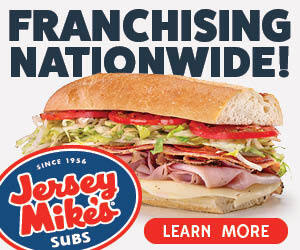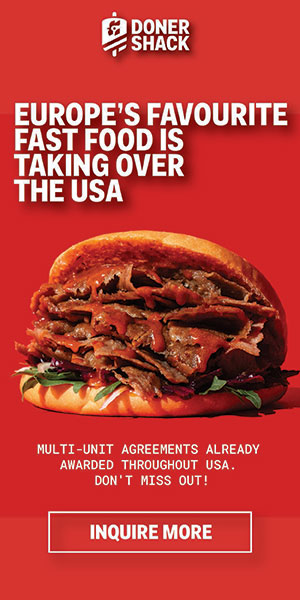Doubling Down on Non-Traditional Expansion Strategies: A Game-Changing Move for QSRs

The quick-service restaurant industry is ever changing, with brands seeking innovative ways to amplify their presence across new markets and drive sales. Today, one of the most compelling strategies in franchise development is growing your unit count with non-traditional restaurant prototypes. Spearheading this type of growth at Little Caesars, I’ve witnessed firsthand the significant advantages this approach can offer and why this trend is gaining momentum across our industry.
The current state of franchise development
To address the shifts in franchising, the economy, and consumer behavior, restaurant development has heightened its focus on diversification and strategic placement. While traditional locations like standalone units and end cap restaurants in strip malls have been the cornerstone of QSR expansion, the landscape is evolving. The rapid restaurant growth in non-traditional venues, such as airports, arenas, amusement parks, colleges, casinos, and gaming areas, presents new opportunities to increase brand recognition with consumers whose dining preferences align with those of your restaurant. It also is another way to generate additional sales and revenue.
The appeal of non-traditional unit expansion
One of the most notable benefits of expanding into non-traditional facilities is the increased brand visibility you’re exposed to with the steady stream of people coming and going. Environments with a high volume of foot traffic present unparalleled exposure to a diverse audience that might not have otherwise encountered their products that day. Additionally, non-traditional venues cater to on-the-go consumers seeking quick and convenient dining options. Food courts in casinos and gaming areas, for instance, align perfectly with consumer preferences for fast, accessible food, while also benefiting from lower labor costs.
Non-traditional venues also play a crucial role in brand differentiation. Positioning a QSR in unexpected locations helps create memorable experiences that set the brand apart from competitors. Locations like amusement parks and gas and convenience store settings offer significant sales potential, thanks to their established customer base. These high-traffic areas ensure consistent revenue streams, making them attractive for QSR expansion. Additionally, the flexibility in footprint and menu options allows brands to adapt to various environments and meet diverse consumer needs, while remaining true to who they are and what they’re known for. By expanding into these non-traditional sites, QSR brands provide franchisees with flexible options to diversify their business portfolios, remain competitive in their markets, and stay top-of-mind with consumers in their communities.
Challenges and considerations
While the advantages are many, expanding into non-traditional venues can present challenges. Operational complexity could be a concern, as managing operations in diverse environments requires adapting to varying logistical and regulatory requirements. QSRs must be prepared to handle these complexities to ensure restaurants run smoothly and each guest receives the dining experience and food product they have come to expect from your brand. Additionally, winning the bids for certain non-traditional locations can take longer to secure than with traditional agreements, as competition is high and there’s a fair amount of red tape to navigate.
Proven success
Fine-tuning the perfect strategy to tap these types of venues for restaurant growth takes time and research. Over the past few years, we’ve networked, made connections, and immersed ourselves into a variety of settings to make the right decisions on which ones make the most sense for Little Caesars, our guests, and franchisees. We’ve celebrated a handful of grand openings in 2024 and have a strong pipeline of additional sites to be announced in the coming months and throughout 2025. Partnerships with sports teams has greatly contributed to growing the company’s presence in major arenas, putting the brand name front and center with guests and prospective franchisees that are looking for unique business opportunities. Similarly, we’re focused on broadening our reach to the younger and energetic demographic across college campuses that seek affordable, convenient, and delicious meals while juggling a busy schedule.
Looking ahead
These examples highlight how non-traditional settings can offer a strategic advantage for QSRs looking to diversify their restaurant prototypes and reach more consumers where and how they want to be met. By selecting high-traffic locations and maintaining operational excellence, franchises can make game-changing decisions that can catapult their brands to the top and position themselves for long-term success in what’s becoming a more competitive market.
Bryan Ketelhut is the national director of non-traditional and development services at Little Caesars.
Share this Feature
Recommended Reading:
| ADVERTISE | SPONSORED CONTENT |
FRANCHISE TOPICS
- Multi-Unit Franchising
- Get Started in Franchising
- Franchise Growth
- Franchise Operations
- Open New Units
- Franchise Leadership
- Franchise Marketing
- Technology
- Franchise Law
- Franchise Awards
- Franchise Rankings
- Franchise Trends
- Franchise Development
- Featured Franchise Stories
| ADVERTISE | SPONSORED CONTENT |

$350,000
$400,000





 The multi-unit franchise opportunities listed above are not related to or endorsed by Multi-Unit Franchisee or Franchise Update Media Group. We are not engaged in, supporting, or endorsing any specific franchise, business opportunity, company or individual. No statement in this site is to be construed as a recommendation. We encourage prospective franchise buyers to perform extensive due diligence when considering a franchise opportunity.
The multi-unit franchise opportunities listed above are not related to or endorsed by Multi-Unit Franchisee or Franchise Update Media Group. We are not engaged in, supporting, or endorsing any specific franchise, business opportunity, company or individual. No statement in this site is to be construed as a recommendation. We encourage prospective franchise buyers to perform extensive due diligence when considering a franchise opportunity.